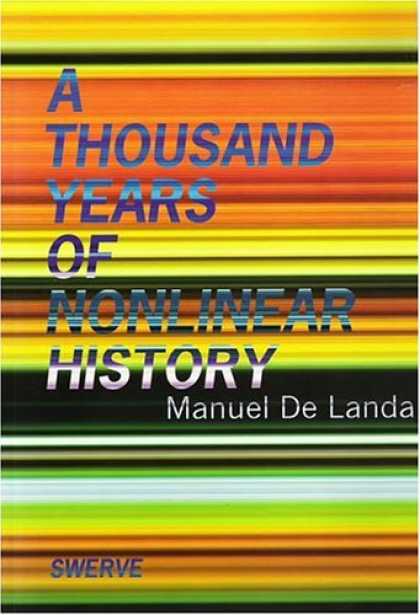
Finished this today. I started it a few years back and put it down; the introduction seemed a bit impenetrable. Then, last year, as I was driving through Yosemite park, I thought of the trees as temporary spikes in the surface of the earth. I felt my environment as process. I blamed this book. I started it up again about two weeks ago. It’s a beautiful synthesis of thought; philosophical in the sense that this book is a unique engagement with the world that is often contagious, often revealing. Manuel De Landa presents the last thousand years through three lenses: biological history, geological history, and linguistic history. I found the first two the most interesting. The interplay of gene flows, biomass, disease, and the changing infrastructural landscape of civilization is fun to watch. These are complex processes, and this book makes you feel as if you can suss out the true influences in major movement. To me, this is the most honest, wide-eyed & ecologically sensitive concept of history that I’ve read. Humans aren’t the heroes: self-organizing flows of energy are. We are just mineralizations, temporary coagulations. From one clot to another: read this.
Tags: a thousand years of nonlinear history, manuel de landa, review, zone books

okay, sweet, this is the kind of thing i needed to hear (read) to get me to actually get this after just staring at the amazon page, thanks ken
Hell yes, Ken! This book bubbles. I echo your enthusiasm for it.
“In a very real sense, reality is a single matter-energy undergoing phase transitions of various kinds, with each new layer of accumulated “stuff” simply enriching the reservoir of nonlinear dynamics and nonlinear combinatorics available for the generation of novel structures and processes” (21).
I wish there would be a surge in conversation about DeLanda’s contributions to contemporary thought. I see him as a powerful nexus of so many seemingly divergent ideas and discourses: from geology to architecture, from meteorology to politics, from Spinoza to Bruno Latour, from the Annales School to Deleuze & Guattari…he’s making such interesting connections.
I’m massively anticipating his new book, scheduled for release on March 17th:
http://www.continuumbooks.com/books/detail.aspx?BookId=158700&SntUrl=144182
I’m sold. I’ll get a copy. Thanks, Ken.
I’m sold. I’ll get a copy. Thanks, Ken.
Yes! I agree. That he can jump off from Deleuze & G, (I find them bafflingly opaque for the most part) and provide example after example to flesh out his points: a rare ability. What a mind.
All right, I’m ordered too, but just so I can go home and longingly open up my copy after Kyle blows my mind with his synthesis of this material in a bar, probably within the next two weeks.
This is God: “self-organizing flows of energy.”
Thanks for doing this write-up. I’ve had this in my Amazon wish list for far too long. This is a nice reminder to buy it.
Read this when I was like sixteen. Probably wasn’t ready for it, but enjoyed the ride.
I found D&G incredibly difficult when I tried ’em out a couple years ago, but then I read this and had no trouble. Loved it, actually, and it helped me understand how to read non-linear compositions much better (which I really needed) even though the book isn’t exactly that. I’ve wanted to re-read it, but that’ll have to wait until summer.
sweet review.
Ken, can you say what (you think) De Landa means by “nonlinear”?
God is the abstract search space. (read)
Sure. He frequently talks about rejecting the linear, sequential view of evolution; this is a key idea, to approach history from a dynamical perspective.
I guess I have to now, huh? Alright. Road lit for this summer. I’ll let you know how it goes.
Och, I’m still not getting it.
For a changing thing in a ‘dynamic’ system, energy and matter inputs (and their biological and linguistic, what, forms? analogues?) are not yet intricated into the changing thing. The changing thing is effected and effective irregularly – even (from a local point of view) randomly.
But that doesn’t mean that change itself is not a direct process: catalysis; a caused cause causing a causal effect.
How is a ‘dynamic’ process not ‘linear’ in its parts, seen finely enough?
You are getting it. Read it!
Mere bubbles in the flux of autonomous material processes though we may be, it’s nice sometimes to be able to put your arm around somebody.